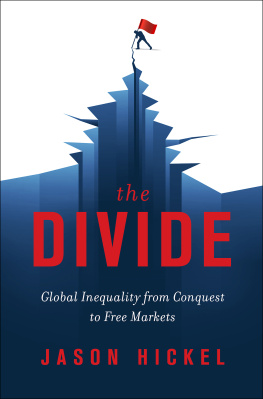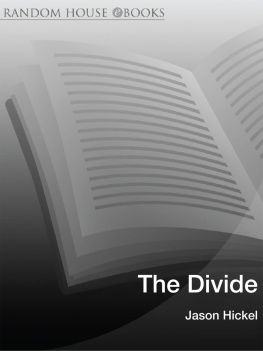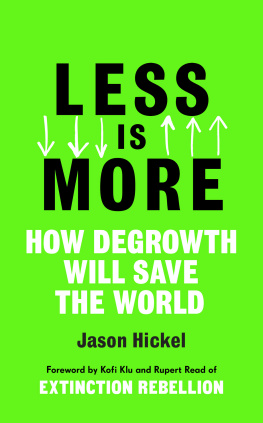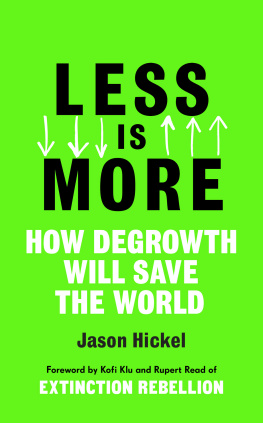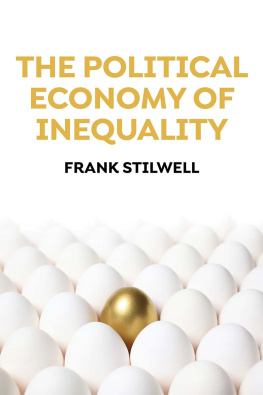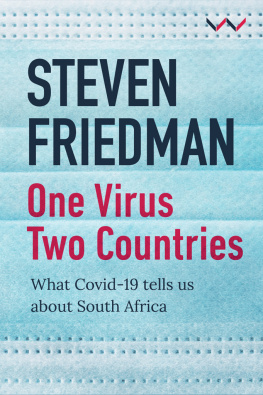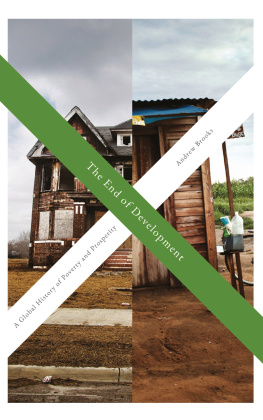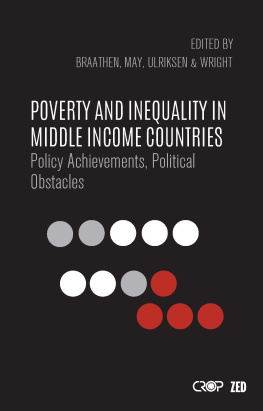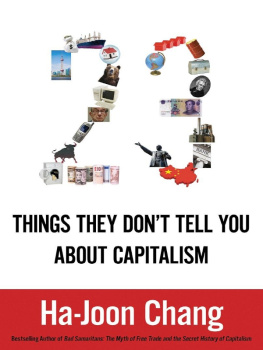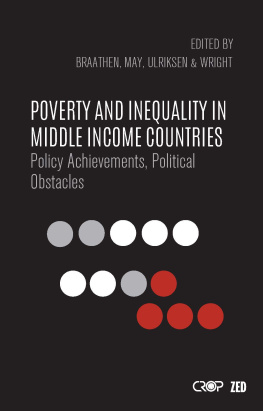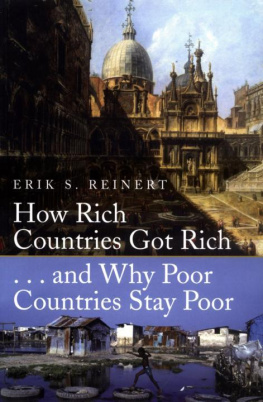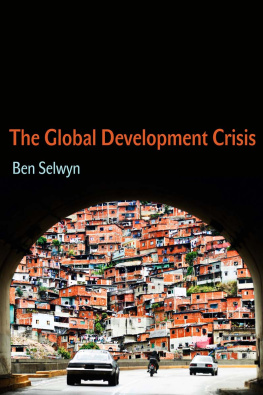
Legend has it that Eduardo Galeano wrote Open Veins of Latin America in only three months, during the evenings after coming home from his day job as an editor. Isabelle Allende mentions this tantalising titbit in her foreword to the book, and when I first read it I was inspired. Galeanos rendition of Latin American history resonated with me; I was impressed by the data he marshalled as evidence and longed for his reporting to extend beyond Latin Americas shores and cover the rest of the South. Thats what I had in mind when I first sat down to write what eventually became The Divide. But I am not Galeano, neither in literary talent nor in pace. While I too wrote mostly on the side, tending by day to my research and teaching obligations at the London School of Economics, this book ended up taking much longer than three months. Still, I owe Galeano for giving me the foolish courage to try.
I also owe many others. To this day, when I sit down to re-read Aim Csaires Discourse on Colonialism, I cant help but feel that he said in 1950 everything that I have tried to say in this book, everything that has bubbled within me for so long, only more brilliantly. So too with figures like Frantz Fanon, Mahatma Gandhi, Walter Rodney, Julius Nyerere, and many others. And then there are those who said more with their lives than with their words who risked everything in the struggle for a fairer world, and were killed for their efforts. From Patrice Lumumba to Salvadore Allende, all the way up to Berta Cceres I count them among my ancestors. They continue to guide and inspire me.
Each chapter that appears in this book draws on thinkers and writers much greater than myself: Ral Prebisch, Andre Gunder Frank, Gernot Khler, Samir Amin, Sanjay Reddy, Frances Moore Lapp, Thomas Pogge, Peter Edward, David Woodward, Lant Pritchett, Mike Davis, Immanuel Wallerstein, Ellen Wood, David Harvey, Naomi Klein, Susan George, William Easterly, Joseph Stiglitz, Ha-Joon Chang, Nicholas Shaxson, Fred Pearce, Bill McKibben, David Graeber, Herman Daly, Vandana Shiva, and countless others whose names appear in the text and the notes. I cannot list them all. I can only hope I have done justice to their work.
Many friends and colleagues have helped me along this journey. Martin Kirk my occasional co-author read an early draft of the manuscript and has offered helpful feedback at a number of junctures. Alnoor Ladha and /The Rules team provided a nourishing and challenging intellectual community wherein I was able to explore and develop many of the ideas that appear in these pages. Rebecca Reid helped me with research in the early stages of the project. Alice Pearson proved to be a helpful interlocutor throughout. Bibi van der Zee at the Guardian and my editors at Al Jazeera English helped me work out my thoughts in columns that ended up providing the basis for certain sections of the book. Ha-Joon Chang was gracious enough to advise me and believe in me when I started to think about publication. Zoe Ross has been supportive and enjoyable to work with the best agent I could have asked for. My editor, Tom Avery, with his careful reading and keen sense for language and narrative flow, has made this book much stronger and more readable than I could have done on my own. And the team at W. W. Norton has been delightful to work with: Ashley Patrick, Jeff Shreve, and Francine Kass, who oversaw the art for the cover.
I researched and wrote this book while on an Early Career Fellowship from the Leverhulme Trust, whose support I gratefully acknowledge. I take full responsibility for whatever faults it bears. And there are no doubt many. For one, I cannot help but feel I have left far too much out important stories neglected for the sake of brevity: the Great Bengal Famine of 1770, for instance, during which ten million Indians were sacrificed for the sake of the British East India Companys profits; the SykesPicot Agreement by which Europe carved up the Middle East; the French colonisation of Indochina; the Vietnam War, which saw the United States commit its full military might to destroy a peasant insurgency asking for land reform; and the seemingly endless foreign military interventions that have been conducted in the Middle East over the past two decades. All of this and more belongs to the story this book sets out to tell.
I must thank my parents for their constant support, which in this case came in the form of kindly asking after the book and then suffering my descriptions of action-packed days spent moving pixels around on a computer screen. Really, writing can be a lonely process. But I have been fortunate to have my partner, Guddi, beside me throughout. During long conversations in the kitchen around our little wooden table, mugs of tea in hand, she helped me shape ideas into arguments and stories, and slogged her way through drafts so shabby I am ashamed they ever existed. I am endlessly grateful for her patience, intellectual companionship and unflagging support all of which she extended while getting on with a career much more important and demanding than my own. Its safe to say that without her I would be a completely miserable bugger.
I grew up in Swaziland a tiny, landlocked country near the eastern seaboard of southern Africa. It was a happy childhood, in many ways. As a little boy I ran around barefoot through sandy grassland with my friends, unhindered by fences or walls. When the monsoon rains hit we would sail tiny bark boats through the dongas, welcoming the wet. We climbed trees and plucked mangoes and lychees and guavas to snack on whenever we grew hungry. During lazy afternoons I would sometimes wander up the hill from our little bungalow along the dirt track towards the clinic where my parents worked as doctors. I still remember the cool of the polished concrete floors and the breezy shade of the courtyard. But most of all I remember the queue the queue of patients winding out of the door, some sitting on wooden benches, others on grass mats, waiting to be seen. To me, it seemed that the queue never ended.
As I grew older, I began to learn about things like TB and malaria, typhoid and bilharzia, malnutrition and kwashiorkor scary words that were nonetheless familiar and well worn among our family. Later still I learned that we were living in the middle of the worst epidemic of HIV/AIDS anywhere in the world. I learned that people were suffering and dying of diseases that could easily be cured, prevented or managed in richer countries a fact that to me seemed unspeakably horrible. And I learned about poverty. Many of my friends came from families that scraped together meagre livelihoods on subsistence farms subject to the constant caprice of drought, or who struggled to find work while living in makeshift shelters in the slums outside Manzini, the countrys biggest city.
They were not alone. Today, some 4.3 billion people more than 60 per cent of the worlds population live in debilitating poverty, struggling to survive on less than the equivalent of $5 per day. Half do not have access to enough food. And these numbers have been growing steadily over the past few decades. Meanwhile, the wealth of the very richest is piling up to levels unprecedented in human history. As I write this, it has just been announced that the eight richest men in the world have as much wealth between them as the poorest half of the worlds population combined.
We can trace out the shape of global inequality by looking at the distribution of income and wealth among individuals, as most analysts have done. But we can get an even clearer picture by looking at the divide between different regions of the world. In 2000, Americans enjoyed an average income roughly nine times higher than their counterparts in Latin America, twenty-one times higher than people in the Middle East and North Africa, fifty-two times higher than sub-Saharan Africans and no less than seventy-three times higher than South Asians. And here, too, the numbers have been getting worse: the gap between the real per capita incomes of the global North and the global South has roughly tripled in size since 1960.
Next page
